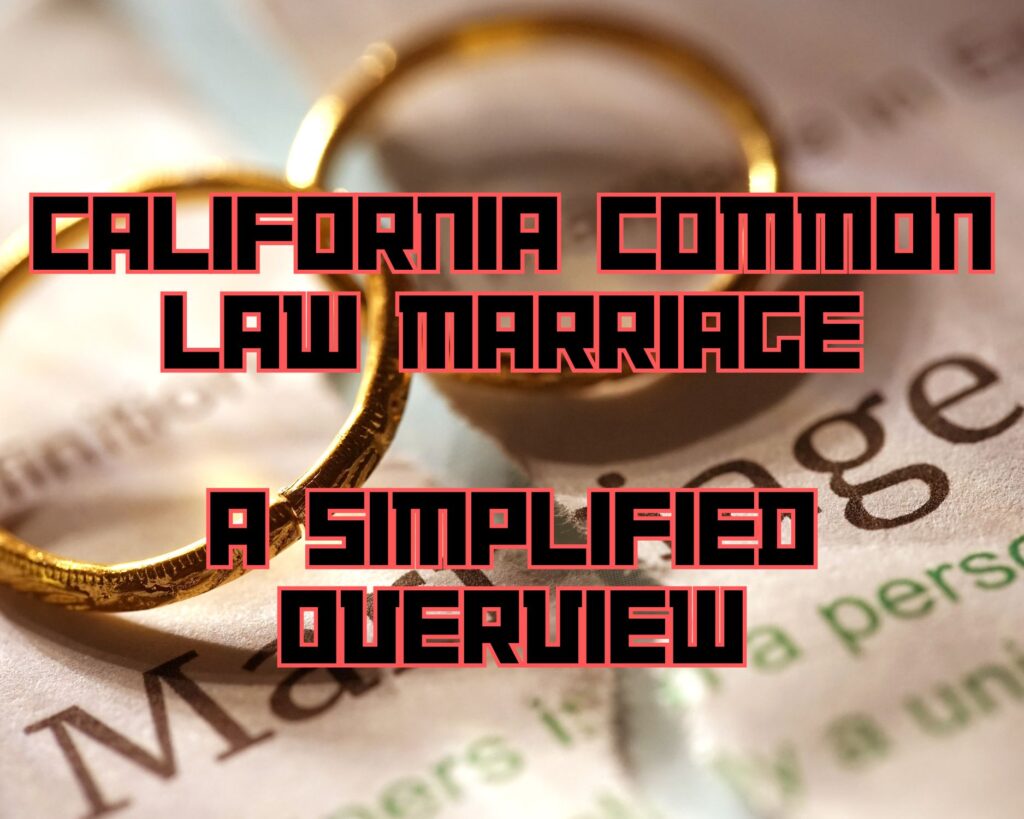When it comes to understanding common law marriage, especially in states like California, it’s important to have clear and straightforward information. This article aims to demystify the concept of common law marriage in California, making it accessible for those without extensive legal knowledge. Additionally, we’ll link to relevant articles from LegalKnowItAll.com for further reading on related topics.
What is Common Law Marriage?
Common law marriage is a form of relationship recognized in some states where a couple lives together for a period and holds themselves out to friends, family, and the community as being married, but without ever going through a formal ceremony or obtaining a marriage license.
Key Characteristics of Common Law Marriage
- Cohabitation: Living together for a significant amount of time.
- Representation: Presenting themselves as a married couple to others.
- Intent: An intention to be married or regarded as a married couple.

Common Law Marriage in California
It’s crucial to note that California does not recognize common law marriage. Couples who live together in California, regardless of the duration, do not gain legal marital status simply by virtue of their cohabitation.
Historical Context
California did recognize common law marriages many decades ago, but this changed in the late 19th century. Since then, the state requires couples to obtain a marriage license and have a formal ceremony to be legally recognized as married.
Legal Implications in California
Since California doesn’t recognize common law marriage, couples living together in the state have different legal rights compared to legally married couples.
Property and Inheritance
- Property Rights: Cohabiting couples in California do not have the same property rights as married couples. Property acquired during cohabitation is generally considered separately owned.
- Inheritance Rights: Without a will, a surviving partner in a cohabiting relationship does not automatically inherit the other’s property.
Healthcare and Employment Benefits
Cohabiting couples may not have the same rights as married couples regarding healthcare decisions and employment benefits like insurance coverage.
Protecting Your Rights
For couples cohabiting in California, it’s important to take steps to protect their rights since common law marriage isn’t recognized.
Legal Agreements
Couples can create legal agreements, such as cohabitation agreements, to outline the division of property and financial responsibilities.
Estate Planning
Estate planning, including wills and trusts, is crucial for cohabiting couples to ensure that their property is distributed according to their wishes.
The Importance of Understanding California’s Stance on Common Law Marriage
Knowing the legal status of common law marriage in California is crucial for couples who cohabit in the state. This knowledge is essential for several reasons, impacting various aspects of their lives together.
Legal Protection and Rights
- Property Rights: Understanding that California does not recognize common law marriage helps couples make informed decisions about property ownership and management. It’s important for cohabiting couples to know that they don’t have the same automatic property rights as married couples.
- Estate Planning: Without the legal framework of marriage, cohabiting partners need to be proactive in estate planning to ensure their assets are distributed according to their wishes in the event of death.
Financial and Healthcare Decisions
- Financial Security: Cohabiting couples should be aware of their financial independence in the eyes of the law. This awareness is crucial for planning joint purchases, investments, and managing debts.
- Healthcare Rights: In medical emergencies, married couples have certain rights to make decisions on behalf of their spouse. Cohabiting couples in California need to set up legal documents like healthcare power of attorney to grant each other these rights.
Family and Children
- Parental Rights: The legal status of a relationship can affect parental rights and responsibilities. Cohabiting couples may need to take additional legal steps to establish paternity and custody arrangements.
- Child Support and Custody: Understanding the legal distinction between cohabitation and marriage can clarify issues related to child support and custody in the event of a separation.
Relationship Recognition
- Legal Clarity: Knowing the legal status of their relationship helps couples understand how they are viewed in the eyes of the law, which is important for everything from filing taxes to making major life decisions.
- Setting Expectations: Understanding that common law marriage isn’t recognized can help couples set realistic expectations about their rights and responsibilities.
Taking Action
Given these implications, it’s important for cohabiting couples in California to:
- Create Cohabitation Agreements: These agreements can outline how property, finances, and other responsibilities are handled during the relationship and in the event of a breakup.
- Engage in Estate Planning: Drafting wills, trusts, and healthcare directives ensures that each partner’s wishes are respected and carried out.
Can a Long-Term Relationship in California Be Considered a Legal Marriage?
No, regardless of how long a couple has lived together in California, their relationship cannot be legally considered a marriage without a formal marriage license and ceremony. California law does not recognize common law marriage.
What Legal Protections Do Cohabiting Couples Have in California?
Cohabiting couples in California do not automatically receive the legal protections and benefits that married couples do. However, they can create cohabitation agreements to outline property rights, financial responsibilities, and other arrangements.
How Can Cohabiting Couples in California Secure Their Financial Future Together?
Cohabiting couples can secure their financial future by creating cohabitation agreements and engaging in joint financial planning. It’s also advisable to have individual estate plans, including wills and trusts, to ensure assets are distributed according to their wishes.
What Happens to Property When a Cohabiting Couple Separates in California?
In the absence of a cohabitation agreement, property acquired during the relationship is generally considered separately owned. Each individual retains ownership of the property they acquired in their name.
Can One Partner Make Healthcare Decisions for the Other in a Cohabiting Relationship?
Without legal documents like a healthcare power of attorney, one partner in a cohabiting relationship does not automatically have the right to make healthcare decisions for the other. It’s important to set up these legal directives to grant each other these rights.
Are Children Born to Cohabiting Couples Treated Differently Under the Law?
Children born to cohabiting couples have the same legal rights as those born to married couples. However, it may be necessary to establish paternity legally, and cohabiting couples should consider setting up custody and child support arrangements.
Do Cohabiting Couples in California File Joint Taxes?
Cohabiting couples in California are not eligible to file joint tax returns as they are not legally married. They must file as single or head of household, depending on their circumstances.
How Can Cohabiting Couples Plan for Retirement?
Cohabiting couples should plan for retirement individually, considering options like individual retirement accounts (IRAs). They can also designate each other as beneficiaries in their retirement plans and life insurance policies.
Conclusion
Understanding the legal aspects of cohabitation in California is crucial for couples living together in the state. While they do not enjoy the same legal benefits as married couples, they can take steps to protect their rights and plan for their future. For more information on legal planning and rights, visiting resources like LegalKnowItAll.com can provide valuable insights and guidance.
As an Amazon Associate we earn from qualifying purchases through some links in our articles.




